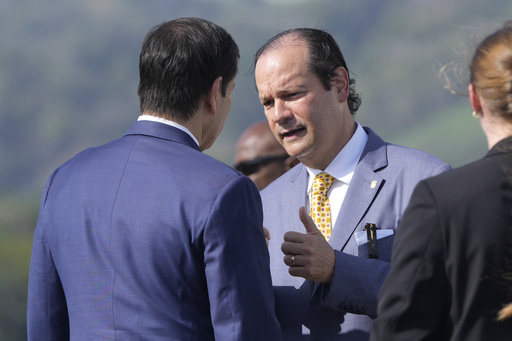
“`html
SANTO DOMINGO, Dominican Republic — During his inaugural international trip, U.S. Secretary of State Marco Rubio aimed to focus on areas that resonate with him personally, including immigration reform, counternarcotics efforts, and limiting China’s influence in Latin America.
However, his five-nation Central America tour became overshadowed by significant political turmoil affecting U.S. foreign policy back home.
Only two weeks into his role, the Miami-born former Florida senator remained committed to his agenda, engaging with leaders from Panama, El Salvador, Costa Rica, Guatemala, and the Dominican Republic.
He was able to secure important agreements concerning the deportation of migrants, and at least one country announced its intention to withdraw from China’s controversial Belt and Road Initiative.
Rubio’s ability to communicate in Spanish, which he predominantly used during discussions and approximately half the time in public appearances, appeared to impress his counterparts.
Nonetheless, the dismantling of the U.S. Agency for International Development and Trump’s unexpected proposal for a U.S. administration of the Gaza Strip overshadowed Rubio’s engagements and personal time.
Here are the key highlights from his trip:
**Navigating the USAID Controversy**
The significant reduction of the U.S. Agency for International Development (USAID) became Rubio’s largest hurdle at the beginning of the tour, especially as he formally assumed responsibility for it during his visit to Panama City.
Quickly opting to delegate his authority to Peter Marocco, another Trump appointee, Rubio faced challenges from development professionals who expressed concerns about potential drastic cuts to international assistance.
On his first day in office, Trump had initiated a freeze on foreign aid, pending a thorough review by the State Department that lasted 90 days. Although Rubio had previously supported foreign assistance, he attempted to mitigate the damage by issuing waivers for emergency food aid and essential programs.
While in Guatemala, Rubio learned of an order to shut down all but the most critical USAID operations while American personnel were instructed to return home within 30 days.
He defended the layoffs and cutbacks, claiming they were a result of agency staff’s failure to comply with spending justifications.
Rubio stated that personnel would be asked to take a leave of absence, giving them 30 days to return if they opted to do so, while indicating that special cases would be taken into consideration.
“It’s not punitive; we just want cooperation from USAID,” he emphasized.
**Addressing Trump’s Gaza Proposal**
The unexpected suggestion from Trump for the U.S. to assume control over the Gaza Strip posed another challenge during Rubio’s travels.
In response to reporters’ queries regarding Trump’s proposal, which would disrupt years of U.S. support for an independent Palestinian state, Rubio sought to minimize its impact, dubbing it a “very generous” offer worthy of serious consideration.
He indicated that any potential U.S. involvement in Gaza should be temporary, reiterating the notion that “people will need to have different living arrangements during that time.”
This perspective diverged significantly from what Trump had articulated during a news conference alongside Israeli Prime Minister Benjamin Netanyahu.
With mixed signals emerging from the White House regarding potential financial commitments or troop deployments, Trump reinforced the idea, leaving it for special envoy Steven Witkoff and possibly Rubio to clarify the details.
Given that Rubio is expected to visit the Middle East within the month, he could face a tough sell, as regional nations, save for Israel, vehemently oppose such measures.
**Concerns about the Panama Canal**
In Panama, Rubio made waves by echoing Trump’s assertions that a reduced Chinese presence near the Panama Canal was necessary for U.S. national security.
With a Hong Kong-based company managing port facilities associated with the canal, Rubio warned that this could pose a direct threat, particularly during any possible military conflict.
Panamanian President José Raúl Mulino indicated that they were already reviewing the contract with the company and would adjust it upon completion of the audit.
Rubio achieved a key concession when Mulino confirmed that Panama would allow its membership in China’s Belt and Road Initiative to lapse after the expiration of the current contract.
Yet, uncertainty remained over a crucial matter regarding canal transit fees for U.S. naval vessels. U.S. officials declared an agreement had been reached to waive those fees, but Mulino rebuffed this claim, calling it a misunderstanding.
He expressed astonishment that an official U.S. statement could be predicated on such a misconception, labeling it unacceptable.
Later, Rubio asserted his understanding of the necessary legal protocols and indicated that while Panama had to adhere to its own governance methods, it was illogical for the U.S. to incur fees under a treaty obligation to protect the canal in times of conflict.
**Establishing Deportation Agreements**
Rubio’s advancements on immigration issues during the trip might pave the way for Trump’s intentions of mass deportations.
He secured accords with both El Salvador and Guatemala to accept deported migrants from the U.S.
In a notable concession, El Salvador’s President Nayib Bukele agreed to welcome not only deportees from any nation but also proposed using El Salvador’s prison facilities for U.S. prisoners if necessary, although this raised various legal complications.
Guatemala committed to enhancing its capabilities to repatriate its nationals expelled from the U.S. and agreed to take in migrants from other countries at U.S. cost.
In his discussions, Rubio also confirmed that the U.S. would support Costa Rica’s immigration enforcement through enhanced biometric technology.
He added that funding for Panama’s deportation flights to various nations would continue.
After observing Colombia migrants boarding a deportation flight, Rubio noted, “It’s apparent that our border can extend far beyond Texas or Mexico; it begins much further south.”
“`

